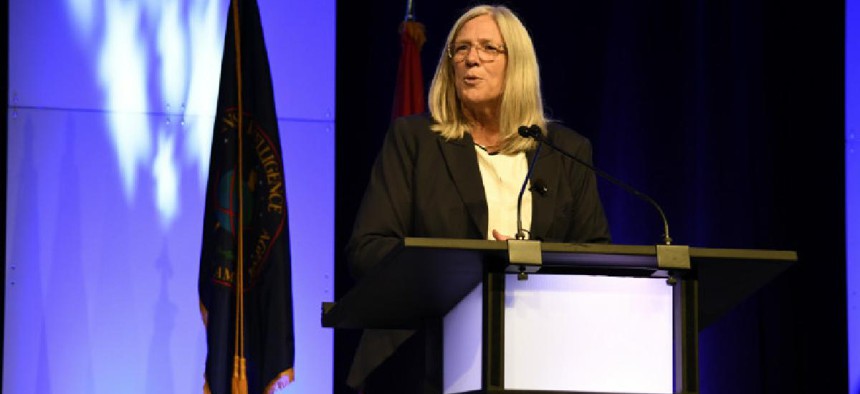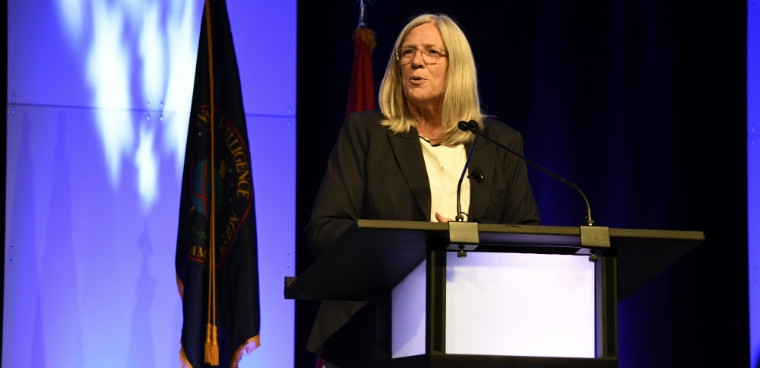Sue Gordon resigns as ODNI deputy

The second highest ranking intelligence official in the federal government resigned, leaving the top two positions at ODNI without permanent leadership. The move coincides with the departure of ODNI chief Dan Coats, as President Trump looks to reshape the intelligence community.

ODNI Deputy Director Sue Gordon, shown here in 2018 at a defense intelligence conference, was pushed out by President Trump as part of a plan to remake the top ranks of the intelligence community. (Photo credit: Maj. Angel Jackson/Defense Intelligence Agency)
The second highest ranking intelligence official in the federal government resigned, leaving the office charged with coordinating and directing the nation's 17 intelligence agencies without permanent leadership for its top two spots.
Following news reports that Sue Gordon, Deputy Principal Director for the Office of the Director of National Intelligence, had decided to resign, President Donald Trump announced on Twitter that Gordon would be stepping down and that Joseph Maguire, Director of the National Counterterrorism Center, would be named acting DNI.
The move has been expected for weeks, and Gordon made it clear in her letter of resignation to the President that the choice was not hers.
"As you ask a new leadership team to take the helm, I will resign my position effective 15 August 2019, and will subsequently retire from federal service," She wrote.
In a private handwritten letter sent to White House reporters, she was even blunter, telling the President she was taking the action "as an act of respect and patriotism, not preference."
After Director of National Intelligence Dan Coats announced his resignation last month -- also at the behest of the President, according to multiple reports – the White House and President Trump repeatedly suggested in public that someone other than Gordon might be selected as acting DNI. However, the 2004 Intelligence Reform and Terrorism Prevention Act that created the office clearly spells out that when a vacancy occurs at the Director position, the Principal Deputy Director "shall act for, and exercise the powers of, the Director of National Intelligence."
Gordon, a career official who gradually worked her way up the chain of command before being nominated for the second highest intelligence leadership post in the country, has garnered widespread respect both inside and outside the intelligence and national security communities over her career. In a statement, Coats called Gordon "a visionary leader" who made "an enormous impact" on the [intelligence community] over the more than three decades she has served." He also praised Maguire, saying he had "a long-distinguished career serving the nation" and would fill the position "with distinction."
Gordon spent the bulk of her career at the CIA, eventually being put in charge of securing and integrating advanced cyber capabilities into the agency's IT assets and set the stage for the move to the cloud with leadership on the Intelligence Community IT Enterprise or ICITE program. She also helped lead to the creation of In-Q-Tel, a CIA-funded non-profit venture capital firm that invests in innovative technologies for the intelligence community.
As Deputy Director of the National Geospatial Intelligence Agency, Gordon helped lead the push to adopt ICITE – "something that sounds yawn inducing, but is actually a move that will enable everything we want to do," she said at a 2016 speech. Gordon won Fed 100 honors in 2016 while at NGA.
The move to push out Gordon (and Coats) has rankled congressional Democrats and a number of former intelligence officials. Many have warned that the Trump administration looks to be clearing the way to install a politically loyal ally to lead an intelligence community that has helped fuel a counterintelligence investigation into the President's own campaign and often contradicted his public statements on the threats posed by Russia to the U.S. election system, North Korea's intentions to denuclearize and other issues.
"President Trump has repeatedly demonstrated that he is seemingly incapable of hearing facts that contradict his own views," said Sen. Mark Warner, vice chair of the Senate Intelligence Committee. "The mission of the intelligence community is to speak truth to power. Yet in pushing out two dedicated public servants in as many weeks, once again the President has shown that he has no problem prioritizing his political ego even if it comes at the expense of our national security."
Warner's counterpart on the committee, Chair Richard Burr (R-N.C.), called Gordon's resignation "a significant loss."
Michael Morrell, former acting and deputy director of the CIA under the Obama administration and a career intelligence official, said Maguire will do a "good job" but that the loss of Gordon will be "devastating" to the intelligence community.
wrote

